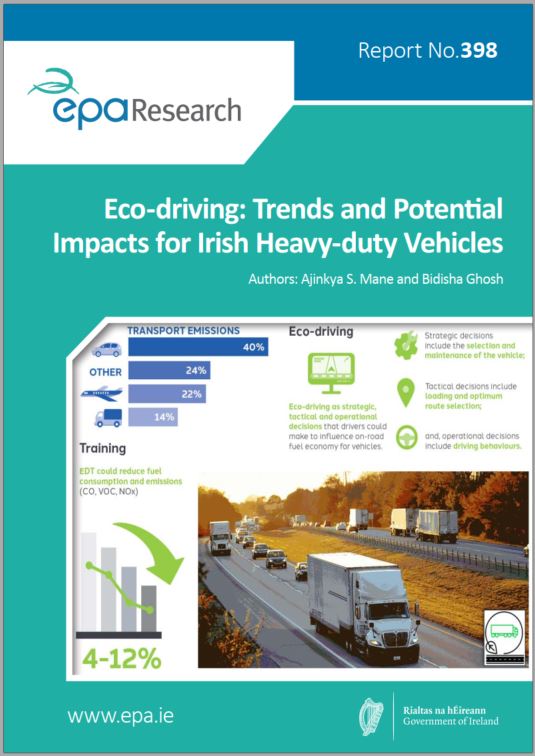Research 398: Eco-driving: Trends and Potential Impacts for Irish Heavy-duty Vehicles
Authors: Ajinkya S. Mane and Bidisha Ghosh
Summary: The “Eco-HDV” research project evaluated the impacts of adaptation of eco-driving programmes in the Irish heavy-duty vehicle fleet, focusing especially on the freight sector. The research identified perceptions and awareness of eco-driving training, reviewed the best eco-driving practices and analysed the possibilities of adaptation of eco-driving programmes. The project generated guidelines for the implementation of eco-driving programmes and other measures to reduce vehicular emissions from the Irish heavy-duty vehicle fleet.

The “Eco-HDV” research project evaluated the impacts of adaptation of eco-driving programmes in the Irish heavy-duty vehicle fleet, focusing especially on the freight sector. Eco-driving and related practices have been shown to improve fuel efficiency and reduce vehicular emissions in heavy-duty vehicle fleets internationally. The research identified perceptions and awareness of eco-driving training in the freight sector, reviewed the best eco-driving practices that exist at present in Ireland, analysed the possibilities of adaptation of eco-driving programmes and developed simulation models to estimate future policy implications. The project generated guidelines for the implementation of eco-driving programmes and other measures to reduce vehicular emissions from the Irish heavy-duty vehicle fleet.
Identifying Pressures
In Ireland, in 2018, the transport sector accounted for the largest share (40%) of energy-related CO2 emissions, and heavy-duty vehicles were one of the top three contributors, accounting for 14% of total transport emissions. The transport sector is dependent on fossil fuels, and CO2 emissions from the transport sector are expected to increase in the absence of a fuel mix. It is expected that activities related to land freight will increase as the economy improves. Furthermore, a new European Union (EU) regulation (2019/1242) has set new standards for CO2 emissions for new heavy-duty vehicles, providing incentives to encourage zero-emission and low-emission vehicles.
Informing Policy
In the light of new EU policies and legislation related to heavy-duty vehicles and the freight sector, it is necessary to develop national policies in Ireland. These policies should introduce a mandatory driver training programme, guidelines and certification for the continuing professional development of heavy-duty vehicle drivers. Eco-driving training should include driver behaviour, attitudes and knowledge of the strategic, tactical and operational aspects of eco-driving. There are multiple private eco-driving training programmes in Ireland and a module on eco-driving techniques is included in the Driver Certificate of Professional Competence training by the Road Safety Authority. The programmes should be standardised for quantifiable benefits. Furthermore, a systematic way to collect, archive and analyse driver performance data from all eco-driving training programmes is essential. The top three government policies expected are incentives for gas-fuelled trucks, electric trucks and driver training programmes.
Developing Solutions
In addition to the implementation of, and policies related to, eco-driving training, a set of solutions related to reductions in vehicular emissions from the Irish heavy-duty vehicle fleet were developed. The research identified that many Irish haulage companies are eager to introduce eco-driving training programmes into their organisations. Based on the collection and analysis of real-world driver behaviour data, professional drivers should be trained or periodically instructed to reduce the number of harsh and general brakes, reduce the amount of vehicle idling during their journeys and improve their skills to drive with smooth acceleration and deceleration. Eco-driving tips given to drivers may help in reducing overall fuel consumption and emissions (carbon monoxide, volatile organic compounds and oxides of nitrogen) in low traffic conditions. The impact that eco-driving has on fuel consumption is uncertain in congested traffic conditions and at signalised intersections. Heavy-duty vehicle priority signals or exclusive lanes at intersections and barrier-free tolls should complement the eco-driving training programme to reduce emissions. In addition, the Irish government is encouraging the use of gas /liquid natural gas technologies by implementing the necessary infrastructure through the Green Connect Project and the Causeway Project. The new heavy-duty vehicle purchase grant scheme will provide grants for up to 30% of the cost differential between a traditional fossil-fuelled heavy-duty vehicle and an equivalent alternatively fuelled vehicle.
https://www.epa.ie/media/epa-2020/research/epa-funded-research/Report-cover-398.jpg